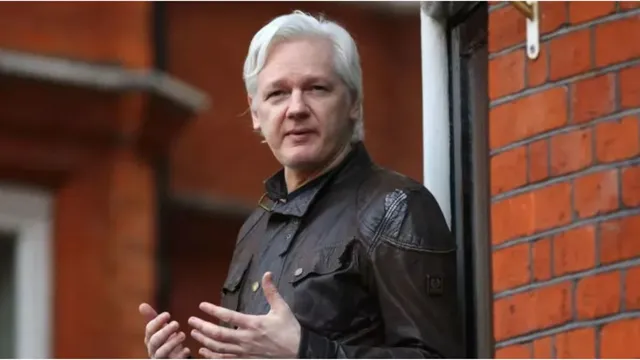- By Shivangi Sharma
- Tue, 25 Jun 2024 12:10 PM (IST)
- Source:JND
WikiLeaks founder Julian Assange was released from Belmarsh prison in the UK on Monday (Local time). Assange, who has entered into a plea deal with the US government, will plead guilty to one count under the US Espionage Act, while the rest of the charges would be dropped and the request for his extradition to the US would be withdrawn.
Assange had been held in the UK for five years while contesting extradition charges from the US, which aimed to prosecute him for disclosing military secrets. The UK government sanctioned his extradition in June 2022. He is set to appear in US territory on Wednesday (local time). Assange has been granted bail by the UK High Court.
The deal is subject to a hearing and sentencing in Saipan on Wednesday morning, where Assange will reportedly appear in person. Upon his guilty plea, Assange will be sentenced to 62 months in prison: the time he's already served in Belmarsh. It puts an end to all the ongoing legal action, including the proceedings in the UK High Court and the extradition order from the UK Home Secretary.
Julian Assange founded WikiLeaks in 2006. The site gained significant attention in April 2010 after releasing a classified video of a 2007 US helicopter attack in Baghdad that killed a dozen people, including two Reuters journalists.
Here’s a look at the timeline of Julian Assange's Wikileaks espionage case:
2006: Julian Assange founded WikiLeaks in Australia, and the organisation started releasing sensitive or classified documents.
April 2010: WikiLeaks publishes nearly half a million documents about the U.S. wars in Iraq and Afghanistan in a series of posts. WikiLeaks also published a leaked video from a US helicopter showing an airstrike that killed civilians in Baghdad, including two Reuters journalists.
July 2010: WikiLeaks releases over 91,000 documents, mainly consisting of secret US military reports about the Afghanistan war.
August 2010: Swedish prosecutors issue an arrest warrant for Assange following allegations of rape by a woman and molestation by another. The warrant is soon withdrawn due to insufficient evidence for the rape allegation. Assange denied the accusations.
February 2011: London's Westminster Magistrates' Court orders Assange's extradition to Sweden. He appeals.
June 2012: The British Supreme Court rejects Assange's final appeal. Five days later, he sought refuge in the Ecuadorian embassy in London and was granted political asylum in August 2012.
August 2015: Swedish prosecutors close investigations into certain allegations against Assange due to the statute of limitations, while an investigation into a rape accusation remains ongoing.
October 2015: The Metropolitan Police cease their 24-hour guard outside the Ecuadorian Embassy, stating they will arrest Assange if he exits, concluding a three-year police operation estimated to be costly.
May 2017: Swedish prosecutors drop their investigation, citing the impossibility of proceeding while Assange remains in the Ecuadorian embassy.
November 2018: A U.S. court filing, which seems to accidentally disclose a sealed criminal case against Assange, is uncovered by a researcher. Details remain unconfirmed.
April 2019: After Ecuador revokes his asylum, Assange is forcibly removed from the embassy and arrested. On May 1, he is sentenced to 50 weeks in prison by a British court for skipping bail. Though he completed the sentence early, he remains in jail awaiting extradition hearings.
May 2019: Swedish prosecutors reopen their investigation into a rape allegation against Julian Assange and announce plans to seek Assange's extradition.
April 2019: Ecuadorian President Lenin Moreno accuses WikiLeaks of recent corruption claims, leading Ecuador to withdraw Assange's asylum status. London police removed Assange from the Ecuadorian Embassy and arrested him for violating bail conditions in 2012, as well as at the request of U.S. authorities.
May 2019: The U.S. government charges Assange with 18 counts related to WikiLeaks' release of classified documents. Prosecutors allege he collaborated with U.S. Army intelligence analyst Chelsea Manning to hack into a Pentagon computer and disclose secret diplomatic cables and military files concerning the Iraq and Afghanistan wars.
June 2020: The U.S. issues a revised indictment against Assange, emphasising his actions to obtain and publish classified information. US Senate report stated that Russia had utilised WikiLeaks to aid Republican Donald Trump in winning the election. Trump dismissed the report as a hoax, and Russia consistently denied any interference in the election.
January 2021: A British judge decides against extraditing Assange to the U.S., citing concerns that he may commit suicide if subjected to severe American prison conditions.
July 2021: The High Court grants the U.S. government approval to challenge the lower court’s decision that prevented Assange's extradition.
June 2022: The UK government orders Assange's extradition to the United States. Assange files an appeal.
May 2023: Australian Prime Minister Anthony Albanese calls for Assange's release, stating that ongoing incarceration serves no purpose.
June 2023: A High Court judge rules Assange cannot appeal his extradition.
February 2024: Assange's legal team initiates a final attempt to halt his extradition at the High Court.
May 2024: The two High Court judges ruled that Assange can pursue a new appeal, focusing on arguments concerning his right to free speech and concerns about being at a disadvantage due to not being a U.S. citizen. The hearing date is yet to be set.
June 2024: The U.S. Justice Department informs the court in a filed letter that Assange will be allowed to go free under a deal with the agency, contingent on his pleading guilty to an Espionage Act charge.
(With inputs from AFP)

